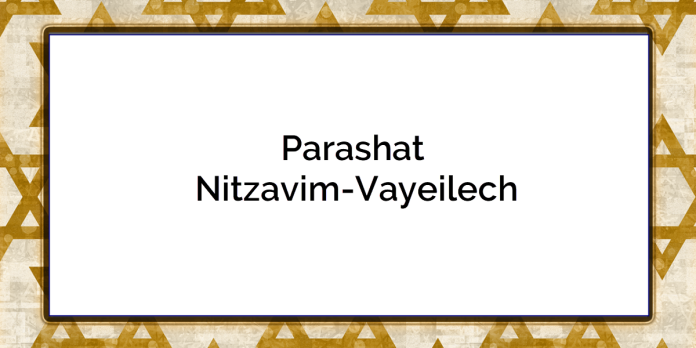Parashat Nitzavim-Vayeilech is a powerful and thought-provoking portion in the Torah that holds immense significance for Jews around the world. These two sections, Nitzavim and Vayeilech, are often read together as they share a common theme of the covenant between Hashem and the Jewish people. In this article, we will delve into the wisdom and insights derived from these parashot, exploring the enduring relationship between Hashem and the Jewish people, and how this bond continues to shape Jewish identity and purpose.
The Covenant Renewed
Parashat Nitzavim begins with a gathering of the entire Jewish nation. Hashem, through Moses, addresses the people, proclaiming, “You are all standing today before Hashem, your God” (Deuteronomy 29:9). This powerful statement underscores the unity and interconnectedness of the Jewish people in their collective commitment to the Divine covenant.
In the opening verses, Moses reminds the Jews of the various stages of their journey, reinforcing the idea that Hashem has been with them every step of the way. It is a reminder of the enduring presence of Hashem in Jewish history and the continued relevance of the covenant to contemporary Jews.
The concept of the covenant is central to Judaism. It is a sacred pact between Hashem and the Jewish people, binding them together in a unique relationship. Nitzavim emphasizes that this covenant is not limited to those present at the time; it extends to all future generations of Jews. This eternal bond underscores the enduring nature of Judaism and its teachings.
The Power of Teshuva (Repentance)
Parashat Nitzavim also introduces the concept of teshuva, or repentance. Hashem’s compassion and willingness to accept the repentance of those who stray from the path of righteousness are highlighted. “Hashem, your God, is a merciful God; He will not abandon you, nor will He destroy you; He will not forget the covenant of your forefathers that He swore to them” (Deuteronomy 4:31). This verse reminds Jews of Hashem’s boundless love and forgiveness, encouraging them to turn back to Him when they err.
The power of teshuva is a central theme in Judaism, emphasizing personal responsibility and the potential for spiritual growth and transformation. Parashat Nitzavim teaches that even when Jews stray from the path, they can always return to Hashem with sincere repentance and be welcomed back into the fold.
Transmitting the Torah
As Parashat Nitzavim draws to a close, Moses underscores the importance of transmitting the Torah to future generations. He emphasizes that the Torah is not a distant or unattainable concept but something that is “very close to you, in your mouth and in your heart” (Deuteronomy 30:14). This idea highlights the accessibility and relevance of the Torah to every Jew, encouraging them to engage with its teachings and principles.
In the transition to Parashat Vayeilech, Moses acknowledges his impending passing, a momentous event for the Jewish people. He appoints Joshua as his successor, ensuring the continuity of leadership and the transmission of Hashem’s guidance to the nation. This moment serves as a reminder of the importance of strong leadership in preserving the Jewish identity and ensuring the faithful observance of the covenant.
The Song of Moses
One of the most poignant moments in Parashat Vayeilech is the Song of Moses, a prophetic poem that Moses delivers to the people. This song encapsulates the cyclical nature of Jewish history, including periods of both faithfulness and rebellion. It serves as a warning of the consequences of forsaking the covenant and a reminder of Hashem’s unwavering commitment to His people.
The Song of Moses predicts future challenges and the ultimate return of the Jewish people to Hashem. It reinforces the idea that the covenant is unbreakable and that, despite the trials and tribulations, the Jewish people will always find their way back to their Creator.
The Role of the Torah Scroll
Parashat Vayeilech also highlights the central role of the Torah scroll in Jewish life. Hashem commands Moses to write down the entire Torah and to place it in the Ark of the Covenant as a perpetual witness. This act symbolizes the enduring importance of the Torah as a guide for Jewish life and a source of inspiration and moral guidance.
Moses is instructed to gather the people, including the elders and officers, and to read the Torah to them every seven years during the Shemitah (Sabbatical) year. This public reading serves to remind the Jewish people of their commitment to the covenant and their responsibility to live according to its precepts.
The Life-Giving Nature of Torah
Parashat Vayeilech reinforces the life-giving nature of the Torah. Moses tells the people, “For it [the Torah] is your life, and through this thing, you will prolong your days on the land to which you cross the Jordan, to possess it” (Deuteronomy 30:20). This verse underscores that the Torah is not merely a set of rules and guidelines but a source of spiritual sustenance and vitality.
Parashat Nitzavim-Vayeilech is a testament to the enduring covenant between Hashem and the Jewish people. It reminds Jews of their collective responsibility to uphold this covenant and transmit its teachings to future generations. Through the concepts of teshuva, the Song of Moses, and the centrality of the Torah, these parashot offer profound insights into the nature of the Jewish relationship with Hashem. As Jews continue to engage with these teachings, they strengthen their connection to Hashem and their commitment to a life guided by His covenant.












